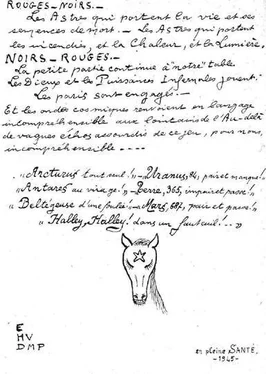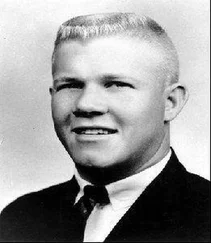As usual, Picasso was experimenting with color, texture, and form. In addition to woodcuts and pen-and-ink drawings, he worked on cardboard, matchboxes, cigarette boxes, even food, like a piece of bread—a reflection of his creative zeal as well as the shortage of canvases under the Occupation. Many of the objects of his paintings—sausages, legs of lamb, grand buffet tables, and the empty cooking pot—reflect the preoccupations and hardships of the period, as did the death’s-heads and grotesque monsters reminiscent of his early cubist days. Even his choice of colors, more black, gray, and beige, seemed to parallel the drab palette of the Occupation.
Sartre, Camus, Beauvoir, and the literary world of the Left Bank were gearing up for a novel event: a new play scheduled to debut on March 19, 1944. The author was Pablo Picasso. The Nazis had refused to allow him to exhibit his paintings in Paris, but they had said nothing about plays.
AFTER leaving Villeneuve-sur-Yonne, Massu and his colleagues reached Auxerre on Monday, March 13, about one o’clock in the afternoon. Along the way, they had stopped by a roadside restaurant, where they encountered a scarcity of food options and jokingly complained about the difficulty, as policemen, of cashing their ration tickets on the black market.
After finishing their coffee, or “roasted barley,” the officers visited the police station, informing the local authorities of the objectives of their mission and obtaining reinforcements to watch railway stations and quays for possible escape. Both Dr. Petiot and Madame Petiot were officially “in flight.”
The rue des Lombards address listed on the note attached to the door at rue Le Sueur belonged to Marcel Petiot’s younger brother, Maurice, who owned a number of properties. He lived, however, in an apartment above his electronics shop on 56 rue du Pont with his wife and two kids, thirteen-year-old Ghylaine and eight-year-old Daniel. A third minor was staying in there: Marcel and Georgette’s son, Gérard, who was studying at the nearby sixteenth-century school, Lycée Jacques Amyot.
The home address was the one that police discovered had first been scribbled on the note and then erased. The detectives were eager to visit, but they first checked out the owner, Maurice Petiot, a thirty-seven-year-old electrician by trade who, in his photograph, looked like a taller, darker, and more handsome version of his older brother. Maurice had struggled financially for a number of years and had declared bankruptcy. More recently, his business had improved dramatically and he had begun investing in properties in the region.
When police arrived at his shop, its shelves stocked with a range of radio and electronic goods in high demand due to the popularity of the BBC and Radio Berlin, Maurice Petiot was not there. His wife, the thirty-one-year-old Marie Angèle Le Guyader Petiot, or Monique, received the officers cordially. She allowed them to look around the premises without a permit. She also agreed, when asked, to escort the detectives three blocks away, to the property at 18 rue des Lombards.
What Massu and his team found was a small château. Built atop a hill, with a gate and metal grilles over the windows, the estate had a labyrinthine cellar with two long corridors that connected into a series of Roman catacombs. How could Maurice Petiot afford this property? Clearly the profits from selling radio and electronics equipment would not have sufficed. Monique explained that the building had been purchased by her father-in-law, Felix Petiot, in the name of her son Daniel.
No one lived at the estate, Monique Petiot said. Indeed, despite its grand exterior, the inside was dusty and untidy, with broken panels and furniture sometimes piled in heaps in the corners, strangely reminiscent of rue Le Sueur. Upstairs, the state of disuse also resembled the Paris town house. There was, as Pierre Malo of Le Matin would later describe it, “the most extraordinary collection of works of art and garbage that it is possible to imagine.” The property, however, did not seem as uninhabited as Monique Petiot claimed.
In a small room on the ground floor near the staircase was a bed with the covers pulled back and the sheets ruffled. Massu asked who had slept there. Was it Marcel or Georgette Petiot? Monique shook her head, saying only that the guest was a family friend, a forty-seven-year-old businessman named Albert Neuhausen, who lived in Courson-les-Carrières, a small town about ten miles south. She had forgotten to mention that.
The inspectors made the short drive to verify the claim. Neuhausen, also in the electronics business, admitted that he knew Maurice and Monique Petiot well. Yes, he had recently stayed with them, he said, as he often did when he took the train to Paris.
Neuhausen had something else to tell the detectives. Although he did not know Dr. Petiot well and certainly had no information on his whereabouts, Neuhausen admitted seeing the murder suspect on the morning of Saturday, March 11. Neuhausen had been in Paris on business, and as a favor for Monique, he had stopped by Petiot’s apartment on rue Caumartin about eleven o’clock to fetch a pair of shoes for Gérard.
“We spoke of things without importance,” Neuhausen said. “The doctor gave me the shoes for his son and a quarter of an hour later, I left.” He took the 5:20 train at Gare de Lyon, arriving at Auxerre at 9:40, and while he had intended to bike home, it was raining and he decided to stay the night at rue des Lombards, just as Monique said. He told detectives that this was all he knew about the matter.
ON Tuesday, March 14, an investigator spotted an attractive woman in a black skirt and a black astrakhan coat, carrying an expensive yellow leather suitcase. She was standing on the platform waiting for a train at the Auxerre station. Slim and petite, she had deep brown eyes and black shoulder-length hair with a few locks falling onto her forehead. She was just four months shy of her fortieth birthday, though she looked much younger. When the policeman approached, the woman did not deny her identity. “I have done nothing wrong,” Georgette Petiot protested, before collapsing on the platform. Two gendarmes carried her out of the station. One young man assisted the police, crying all the while. This was her son, Gérard.
Massu, informed of the arrest, returned at once to the Auxerre police station. Georgette was taken to his car. Already in the vehicle was her brother-in-law Maurice, who had been apprehended the previous night when he returned home from the nearby villages of Cheney and Joigny. Georgette rested her head on his shoulder. Her “short sobs” broke up the otherwise silent ride back to Paris.
7.
“BESIDE A MONSTER”
HELP us FIND YOUR HUSBAND. WE’LL HELP YOU ESTABLISH THE TRUTH.
—Commissaire Massu to Georgette Petiot
NEWS of the arrests spread quickly, and when Massu’s car approached his office on the Quai des Orfèvres, a crowd of reporters and photographers was already waiting. Commissaire Massu helped Georgette and Maurice Petiot out of the car, trying to shield them from the cameras popping and flashing in a disorienting barrage of blue magnesium light.
Massu was particular about how he wanted to question suspects. For one thing, he preferred to interrogate them alone, or in the company of a deputy who remained silent. A room full of police officers and observers posed far too many problems. Countless interrogations, Massu knew, had been derailed by an untimely interruption from an aggressive yet inexperienced officer.
Above all, Massu believed in dealing mainly in hard evidence and rational deductions grounded in fact. He would first attempt to gain an early admission, however insignificant, that would penetrate the defenses a suspect had almost invariably constructed. Then he would proceed as soon as possible to the moment that he called “the intrusion of an elephant into a porcelain shop”—that is, the awkward question, based on evidence and the suspect’s previous admissions, that simply could not be parried without making a major contradiction or otherwise losing credibility.
Читать дальше












